

The Art of Thought: Graham Wallas on the Four Stages of Creativity, 1926 – Brain Pickings. By Maria Popova.
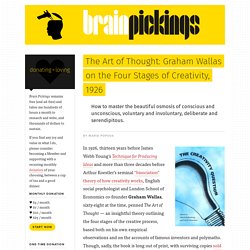
Einstein, Anne Lamott, and Steve Jobs on Intuition vs. Rationality – Brain Pickings. By Maria Popova In putting together this recent reading list of nine essential books on reading and writing — a master-toolkit for a worthy New Year’s resolution to read more and write better — I found myself rereading A particular passage from it has stayed with me over the years, and reemerges by some uncanny, invisible mechanism at critical times of my life, as if to remind me where the truth lies: You get your intuition back when you make space for it, when you stop the chattering of the rational mind.
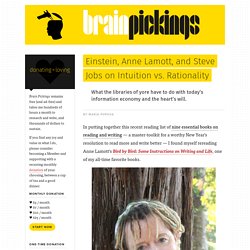
The rational mind doesn’t nourish you. You assume that it gives you the truth, because the rational mind is the golden calf that this culture worships, but this is not true. Famous Writers’ Sleep Habits vs. Literary Productivity, Visualized – Brain Pickings. “In both writing and sleeping,” Stephen King observed in his excellent meditation on the art of “creative sleep” and wakeful dreaming, “we learn to be physically still at the same time we are encouraging our minds to unlock from the humdrum rational thinking of our daytime lives.”
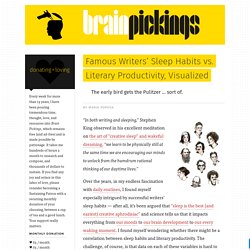
Over the years, in my endless fascination with daily routines, I found myself especially intrigued by successful writers’ sleep habits — after all, it’s been argued that “sleep is the best (and easiest) creative aphrodisiac” and science tells us that it impacts everything from our moods to our brain development to our every waking moment. I found myself wondering whether there might be a correlation between sleep habits and literary productivity. Friedrich Nietzsche on Why a Fulfilling Life Requires Embracing Rather than Running from Difficulty. German philosopher, poet, composer, and writer Friedrich Nietzsche (October 15, 1844–August 25, 1900) is among humanity’s most enduring, influential, and oft-cited minds — and he seemed remarkably confident that he would end up that way.
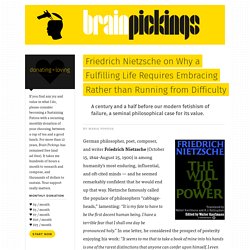
Nietzsche famously called the populace of philosophers “cabbage-heads,” lamenting: “It is my fate to have to be the first decent human being. I have a terrible fear that I shall one day be pronounced holy.” In one letter, he considered the prospect of posterity enjoying his work: “It seems to me that to take a book of mine into his hands is one of the rarest distinctions that anyone can confer upon himself. I even assume that he removes his shoes when he does so — not to speak of boots.” Susan Sontag on Storytelling, What It Means to Be a Moral Human Being, and Her Advice to Writers – Brain Pickings. Happy Birthday, Brain Pickings: 7 Things I Learned in 7 Years of Reading, Writing, and Living – Brain Pickings.
By Maria Popova UPDATE: The fine folks of Holstee have turned these seven learnings into a gorgeous letterpress poster inspired by mid-century children’s book illustration.
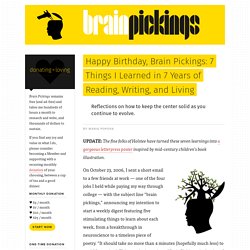
On October 23, 2006, I sent a short email to a few friends at work — one of the four jobs I held while paying my way through college — with the subject line “brain pickings,” announcing my intention to start a weekly digest featuring five stimulating things to learn about each week, from a breakthrough in neuroscience to a timeless piece of poetry. “It should take no more than 4 minutes (hopefully much less) to read,” I promised. This was the inception of Brain Pickings. Charles Bukowski, Arthur C. Clarke, Annie Dillard, John Cage, and Others on the Meaning of Life – Brain Pickings. The quest to understand the meaning of life has haunted humanity since the dawn of existence.
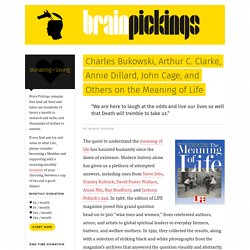
Modern history alone has given us a plethora of attempted answers, including ones from Steve Jobs, Stanley Kubrick, David Foster Wallace, Anais Nin, Ray Bradbury, and Jackson Pollock’s dad. In 1988, the editors of LIFE magazine posed this grand question head-on to 300 “wise men and women,” from celebrated authors, actors, and artists to global spiritual leaders to everyday farmers, barbers, and welfare mothers. In 1991, they collected the results, along with a selection of striking black-and-white photographs from the magazine’s archives that answered the question visually and abstractly, in The Meaning of Life: Reflections in Words and Pictures on Why We Are Here (public library). Here is a selection of the answers.
Pulitzer Prize winner Annie Dillard: We are here to witness the creation and abet it. Legendary science writer Stephen Jay Gould: The Ego and the Universe: Alan Watts on Becoming Who You Really Are – Brain Pickings. During the 1950s and 1960s, British philosopher and writer Alan Watts began popularizing Eastern philosophy in the West, offering a wholly different perspective on inner wholeness in the age of anxiety and what it really means to live a life of purpose.
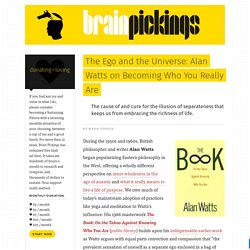
We owe much of today’s mainstream adoption of practices like yoga and meditation to Watts’s influence. His 1966 masterwork The Book: On the Taboo Against Knowing Who You Are (public library) builds upon his indispensable earlier work as Watts argues with equal parts conviction and compassion that “the prevalent sensation of oneself as a separate ego enclosed in a bag of skin is a hallucination which accords neither with Western science nor with the experimental philosophy-religions of the East.” He explores the cause and cure of that illusion in a way that flows from profound unease as we confront our cultural conditioning into a deep sense of lightness as we surrender to the comforting mystery and interconnectedness of the universe.
Antoine de Saint-Exupéry on How a Simple Human Smile Saved His Life. Though researchers since Darwin may have spent considerable effort on the science of smiles, at the heart of that simple human expression remains a metaphysical art — one captured nowhere more beautifully and grippingly than in a short account by Antoine de Saint-Exupéry (June 29, 1900–July 31, 1944), found in Letter to a Hostage (public library) — the same exquisite short memoir he began writing in December of 1940, a little more than two years before he created The Little Prince on American soil, which also gave us his poignant reflection on what the Sahara desert teaches us about the meaning of life.
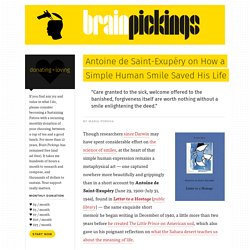
In a creative sandbox for what would become Saint-Exupéry’s most famous line in The Little Prince — “What is essential is invisible to the eye.” — he writes: How does life construct those lines of force which make us alive? […]Real miracles make little noise! Essential events are so simple! Antoine de Saint-Exupéry on What the Sahara Desert Can Teach Us About the Meaning of Life – Brain Pickings.